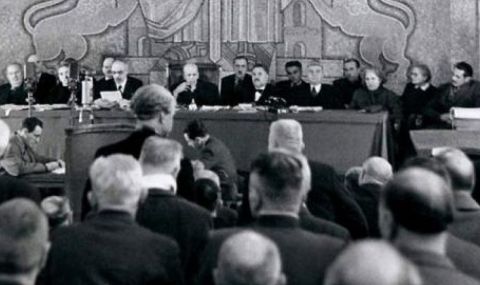Black Thursday - that's what they call the night of February 1 to 2, 1945. Then in Orlandovtsi, the cemetery of Sofia, under the cover of night, in a pit dug by the bombings, the elite of the nation was mercilessly killed.
On February 1, the verdicts of the First and Second Chambers of the so-called People's Court were pronounced,
organized by the OF government, on the orders of Georgi Dimitrov from Moscow, recalls the website “Voices“.
With the verdicts in 1945 The three regents were sentenced to death without the right of appeal - Prince Kiril Preslavsky (brother of the late Tsar Boris III), Prof. Bogdan Filov and Gen. Nikola Mihov, 22 ministers, 67 deputies of the 24th National Assembly, 47 generals and senior officers and 8 royal advisors.
Sentenced to death were 67 deputies, the three governments for the period January 1941, headed by Prime Ministers Bogdan Filov, Dobri Bozhilov and Ivan Bagryanov.
The three regents of the minor Simeon II - Prince Kiril Preslavsky, Prof. Bogdan Filov and Gen. Nikola Mihov, nine secretaries to the palace, publishers of central newspapers and publicists, 47 generals and colonels. The remaining deputies and ministers escaped with varying prison terms.
Only one prime minister survived - Konstantin Muraviev, and his cabinet, who ruled the country from September 3 to September 9, 1944 and was overthrown in a coup.
Muraviev received a life sentence and was released from prison in 1961.
The verdict was pronounced at 4 p.m. on February 1 in front of a 150,000-strong rally in the center of Sofia.
It was executed after a few hours, and there is no record of the execution. There is no grave either. Those sentenced to death are deprived of the consolation of hugging their parents, children and wives for the last time, and they are even deprived of the human right to mourn and bury their dead.
Tied in chains, the people are driven in trucks to a hole from a bomb in the area of the Sofia cemeteries. There is no prosecutor or priest at this execution. They are shot one by one. The first bullet is for Prince Kiril Preslavsky, brother of Tsar Boris III.
According to testimonies, before the execution of the sentences, arguments arise about who should personally shoot whom, with the greatest appetites being shown towards him.
Horrified by the chaos and inept shooting, in which people fall wounded but not killed, Professor Alexander Stanishev, a famous cardiologist and former Minister of Health, asks the killers to allow him to establish their deaths so that they do not throw them half-dead into the grave. Finally, they kill him - they shoot him in the back of the head with a pistol, as he kneels over the last one shot. The bodies are thrown down the ramp and buried with cinders. Despite the secrecy, the truth about the massacre of Bulgaria's statesmen spread quickly throughout Sofia after that ominous night.
